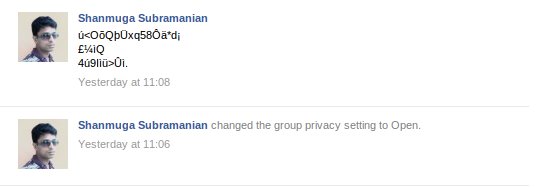Social networking sites play a growing role in activist and revolutionary organization around the globe, including the Occupy Wall Street and the Arab Spring movements during the past year. At the same time, there is increasing concern among activists at the possibility of surveillance of those networks at the hands of political enemies or hostile authority figures.
A Chrome extension by hobbyist programmer Shan Subramanian seeks to draw attention to that threat, by automating the encryption of select Facebook groups. Encrypt Facebook uses AES-256, a cypher approved for the transfer of top secret documents by the National Security Agency, to close a Facebook group to any viewers who don’t have the passphrase.
I tested Encrypt Facebook on an open group Subramanian set up to demonstrate the software. Here’s a screen capture showing the group as publicly viewable:
And here’s a screen capture with the passphrase entered into the extension:
Subramanian is an IT worker from Chennai, India. He was inspired to write the extension, he said, by his opposition to the policies of current Indian Minister of Science and Technology Kapil Sibal, who has called for the censorship of content on sites including Google and Facebook.
“This should be used by common people who fight against atrocities or over-censorship by government,” Subramanian wrote in an email message. “Many governments stifle free speech by snooping in on discussions and arresting people involved in it.”
Subramanian hopes that his and similar user-friendly encryption tools will be used by activists in corrupt regimes. He’s also released an Android-based tsunami alert system for individuals living near the Pacific, Atlantic and Indian oceans.
“Corrupt governments don’t want people to get enlightened and fight for their interests, as it would destroy vested interests whom they support,” he wrote. “Facebook is also a party to it as they more readily hand over data regarding common people to governments.”
One of Subramanian’s previous projects was TextOnly, an Android-based browser that renders only the readable portions of web sites, gained significant media coverage last year–including mentions in Wired and the New York Times‘ 2011 “Top 10 Apps for Android” list.
One of his next projects, he said, is a peer-to-peer social network that operates between smartphones.








